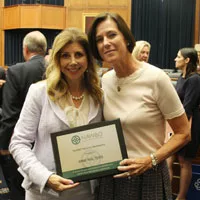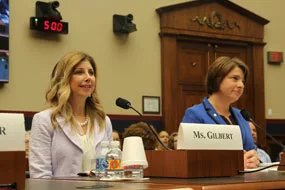 The Workflex in the 21st Century Act would make it easier for employers to offer innovative paid leave and flexible work options to support employees’ work/life needs, while enabling employers to attract and retain the talent they need to meet their business goals. That’s why former NAWBO National Board member Loreen Gilbert testified before the House Subcommittee on Health, Employment, Labor and Pensions on July 24 in support of the bill, also known as H.R. 4219, which was introduced by Rep. Mimi Walters, R-Calif., in November 2017. “The Workflex in the 21st Century Act is a win-win for businesses and their employees and provides Americans with the flexibility they desire when it comes to striking the right work/life balance,” said Rep. Tim Walberg, R-Mich., the committee’s chairman. Below is a transcript of Loreen’s testimony:
The Workflex in the 21st Century Act would make it easier for employers to offer innovative paid leave and flexible work options to support employees’ work/life needs, while enabling employers to attract and retain the talent they need to meet their business goals. That’s why former NAWBO National Board member Loreen Gilbert testified before the House Subcommittee on Health, Employment, Labor and Pensions on July 24 in support of the bill, also known as H.R. 4219, which was introduced by Rep. Mimi Walters, R-Calif., in November 2017. “The Workflex in the 21st Century Act is a win-win for businesses and their employees and provides Americans with the flexibility they desire when it comes to striking the right work/life balance,” said Rep. Tim Walberg, R-Mich., the committee’s chairman. Below is a transcript of Loreen’s testimony:
Statement of Loreen Gilbert, CIMA, AIF, CRC, CLTC President, WealthWise Financial Services
Submitted to
The U.S. House of Representatives Committee on Education and the Workforce Subcommittee on Health, Employment, Labor, and Pensions
Hearing on
H.R. 4219
Workflex in the 21st Century Act
July 24, 2018
 Thank you, Chairman Walberg, Ranking Member Sablan and members of the Committee. My name is Loreen Gilbert. I am the founder and president of WealthWise Financial Services, a wealth management firm headquartered in Irvine, California. I am a small business owner dedicated to the financial success of the business owners and executives whom we service. In addition, I am equally dedicated to the employees who support me every day in helping our clients. I currently have four employees and am in the hiring process for an additional position.
Thank you, Chairman Walberg, Ranking Member Sablan and members of the Committee. My name is Loreen Gilbert. I am the founder and president of WealthWise Financial Services, a wealth management firm headquartered in Irvine, California. I am a small business owner dedicated to the financial success of the business owners and executives whom we service. In addition, I am equally dedicated to the employees who support me every day in helping our clients. I currently have four employees and am in the hiring process for an additional position.
For the past decade, I have been an active member of NAWBO, the National Association of Women Business Owners. I was the president of my local chapter, served on the California board and the past four years served on the national board. NAWBO represents the more than 10 million women business owners across the United States.
I appreciate the opportunity to speak to the Subcommittee today regarding H.R. 4219, known as the “Workflex in the 21st Century Act.” This proposed legislation aims to bring federal legislation in line with today’s employee needs and expectations, while reducing employer uncertainty regarding compliance with a confusing mosaic of state and local-mandated labor laws.
Standardizing flexible work arrangements and paid leave will enable employees to strike the work-life balance they desire and provides employers with the certainty of being in compliance. Best of all, this legislation is voluntary at both the employer and the employee level. Recognizing that each industry, each company and each employee has individual needs, this proposed legislation has an opt-in provision. And in today’s diverse workforce, this opt-in feature provides the choice both employers and employees are seeking.
Labor laws play an important role and are necessary to protect employees. At the same time, simplifying the compliance requirements of multiple labor regulations would enable employers to give workers the flexibility they increasingly demand, while confidently growing their businesses across state lines.
Let me begin with my personal story. I pursued a career in financial services because growing up I saw my mother, as a single mom, struggling to put food on the table and keep a roof over our heads. In that era, there was no work flexibility that allowed for a single mother to pick up her children after school or to stay home when children or an elderly parent was sick. Few working parents were able to participate in their children’s after-school activities. I was the proverbial “latch key kid,” coming home to an empty house and fending for myself until my mom got home at night. Because of my background, I am especially sensitive to the challenges that single mothers and, frankly, all mothers face in the workplace.
Twenty-one years ago, I left corporate America, recognizing that in order to have the workplace flexibility I desired, I would need to be self-employed. The investment world was and still is male-dominated and did not favor nor cater to women. After spending a decade in the investment industry, I knew that to have the life I desired, I would need to create my own path. So I started the journey as an independent financial advisor.
It is not by happenstance that this bill was authored by a female Congresswoman, Mimi Walters, and that her first two co-sponsors are also female members of Congress. With all the headway that women have made in the workforce, flexibility still eludes us. Just this week, I spoke to a colleague of mine whose wife was pursuing a PhD in immunology when she had her first child. At that time, she felt that she had no options to pursue her career and be a mother. In her industry, it was ‘all or nothing,’ and her heartstrings pulled her to stay home. I am sure this Subcommittee can appreciate the long-term financial implications for this woman and so many other women like her when it comes to reduced Social Security benefits as well as to her own financial independence.
We are fortunate that the modern workplace has opened some doors and changed how we think about when and where work is done. This makes all the difference for employees navigating trying times, and for employers who want to help them through times of need. Many companies, including my own, provide a measure of work flexibility. For instance, one of my employees is a single mom who has to pick up her daughter and transport her to an after-school facility. I have provided her the flexibility to take a late lunch and we arrange our client meeting schedule around her family needs. A few years ago, the father of one of my key employees was diagnosed with terminal cancer. To care for him in his time of need, she had to commute to another state almost every week. Soon after his passing, her beloved grandmother, also living out of state, started to rapidly decline in health. During this extraordinarily difficult time, we did everything we could to support her through taking time off and taking on her workload so that she could tend to family matters.
So you might ask, “Why is this legislation needed if you already provide workplace flexibility?” Regrettably, workplace policies have not kept up with the times. The current patchwork of state and local laws makes facilitating paid leave and flexible work arrangements overly complicated, especially for multi-state employers.
For example, one of my clients owns multiple running shoe stores and hires hourly employees to work in those stores. Many of their employees want to work more hours in one week to have the flexibility to work less hours in the next week for both family and personal leisure reasons. Right now, the employer cannot accommodate them because of the increased cost of overtime regulations. As a result, the employees think the employer is not being flexible when, in fact, it is our antiquated laws that are not flexible.
Many employers I know are in similar situations and are doing all they can to offer their employees the flexibility they need to balance all of their responsibilities. As another example, one of my fellow NAWBO members allowed her employees to donate any leftover Paid Time Off they had into a pot that their fellow employees were allowed to dip into when personal crises forced them to use up all of their allotted time off.
For the past 21 years, I have built my business in the state of California. For the past 13 of those years, I have had employees. Our state laws change so much that I have to regularly hire an HR expert to make sure that my employee guidebook is accurate and that I am in compliance. My desire is to expand and have offices in multiple states across the country. However, as a small business owner, the thought of dealing with multiple state workplace rules and regulations has so far stopped me from opening offices in other states. If I could opt into federal legislation, such as this one, that would cover me across all states, that would give me the confidence to expand my business and employ workers across the country.
In addition, both small and large employers are in a war for talent. Our economy is strong and our unemployment is at historic lows. To top it off, the Millennial generation brings a different mindset to the workplace than my own generation. They oftentimes value flexibility and paid leave more than they do pay increases. And if they don’t perceive that they have the flexibility and paid leave they desire, they will quit. Therefore, in order to retain and attract more Millennials, just this month, I expanded my own company paid leave policy. I now offer 10 days paid leave per year from five days per year in the first year, after a 90-day waiting period. We also offer three sick days per year plus all New York Stock Exchange holidays.
Through this Workflex legislation, we can encourage more employers to adopt paid leave and flexible work options. And by simplifying regulations, we can embrace the changes that are taking place around us, adjusting the workplace in line with the values of today’s employees.
This bill strikes the right balance between the flexibility needed by employees and the stability and consistency necessary to employers. Both employees and employers stand to benefit from this legislation.
Thank you for allowing me this time to address the Subcommittee today on this important piece of legislation and thank you for your efforts in modernizing the workplace.
To view the original testimony transcript, click here: https://edworkforce.house.gov/uploadedfiles/testimony_gilbert_7.24.18.pdf

